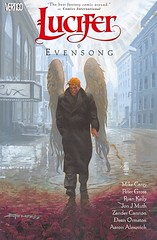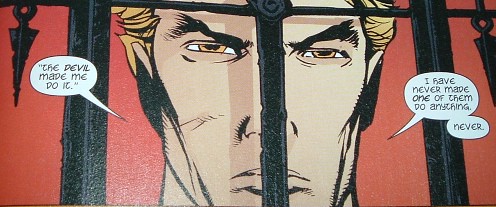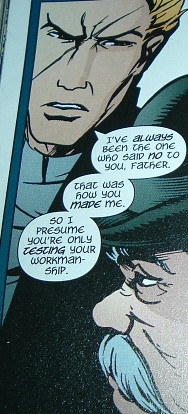Bill Willingham's series Fables gets a lot of credit for carrying on the audience that devoured Sandman 15 years ago. They certainly share a lot of common threads: mixture of fastasy, myth and "real life" all rolled into one big postmodern stew. In reality, though, Mike Carey's series Lucifer is much more in the tradition of Sandman. Lucifer started as a spin-off from Gaiman’s iconic series Sandman when Carey took the idea of Lucifer as a hero and turned it into a darkly philosophical story.
The new trade Evensong collects issues 70-75 of Carey’s series Lucifer, bringing the series to a final conclusion (oddly, the original Sandman series also ran for 75 issues). The Christian God Yahweh has left the universe and turned its management over to the hands of Elaine Belloc, a young woman with a mystical and mythical past. Elaine’s story of recreating the afterlife encompasses a large part of the book, and it works as an oddly fascinating form of world-building. Like Yahweh, Lucifer left his realm of hell, releasing all the tortured souls out into the rest of the universe. Lucifer visits old friends and enemies, closing plot threads and making final amends to those few he feels emotional ties with.
Once Lucifer leaves the known universe he meets the one entity he wants to avoid more than any other: Yahweh. With comics you often expect a battle royale. Something like Lucifer pulling a giant flaming sword out of nowhere and Yahweh knocking him around with his bare hands. But instead the two argue like people who once loved each other but were driven apart through circumstances and choices they made. The two enter into a debate arguing points of destiny versus free will that echoes both Milton’s Paradise Lost and the C.S. Lewis classic The Screwtape Letters. Overall, it’s a very fitting end to a series that works better than a lot of fantasy fiction being published today in novels and short stories.
Done by a different artist for each issue, the series doesn’t have an overall visual style. The issues featuring Elaine are simpler, working in a more direct comic book style while those featuring Lucifer hold a grittier feel. Evensong also includes a 48 page stand-alone story titled Nirvana that’s brilliantly illustrated by the dark and disturbing watercolors of Jon J. Muth.
I've only read a smattering of issues of Lucifer over the past few years. It was one of those titles I thought I'd start picking up when I had more money. But now reading the ending and seeing how well things close out, it's making me want to crack open my paypal account and start picking up the earlier trades so I can see how it all developed.
Excelsior.




No comments:
Post a Comment